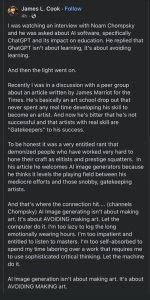ecorche
Anatomical Model
- Joined
- Jul 9, 2020
- Posts
- 528
Here is what ChatGPT has to say about when it should be credited:
"You should credit OpenAI's ChatGPT whenever you use it as a source of information or help in your writing. This can be done by adding a note or citation that states "Powered by OpenAI's GPT-3 language model." The exact format and placement of the credit can vary depending on the context and your specific citation style."
So, "whenever you use it as a source of information or help" is a pretty broad brush. Maybe I should start crediting my thesaurus, too. LOL.
"You should credit OpenAI's ChatGPT whenever you use it as a source of information or help in your writing. This can be done by adding a note or citation that states "Powered by OpenAI's GPT-3 language model." The exact format and placement of the credit can vary depending on the context and your specific citation style."
So, "whenever you use it as a source of information or help" is a pretty broad brush. Maybe I should start crediting my thesaurus, too. LOL.
